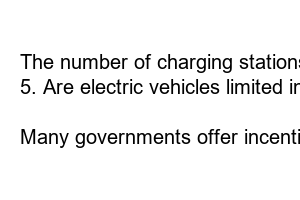전기차 장단점
Title: The Pros and Cons of Electric Vehicles: A Closer Look
As the world continues to embrace sustainable alternatives, electric vehicles (EVs) have gained significant attention. With their promising environmental benefits and the potential to revolutionize transportation, EVs are undoubtedly a hot topic. In this blog post, we explore the advantages and disadvantages of electric vehicles, shedding light on both sides of the coin.
1. Clean and Green: Benefit to the Environment
Electric vehicles are powered by electricity, which means they produce zero tailpipe emissions, combatting air pollution and reducing overall greenhouse gas emissions. **By switching to electric vehicles, we can take a significant step towards a cleaner and greener future.**
2. Cost Savings: Fuel and Maintenance
Compared to conventional cars, the cost of charging an EV is considerably lower than buying fuel, especially when electricity prices are subsidized or during off-peak hours. Furthermore, EVs require fewer maintenance visits since they have fewer moving parts and don’t need regular oil changes. **With an electric vehicle, you can rejoice in long-term cost savings.**
3. Rippling Effects: Energy Independence
Electric vehicles help reduce our reliance on fossil fuels for transportation and promote energy independence. With the use of renewable energy sources to charge EVs, we can harness the full potential of sustainable resources, mitigating our carbon footprint. **By supporting electric vehicles, you contribute to a more resilient and self-reliant energy future.**
4. Limited Range and Charge Station Availability: the Range Anxiety Factor
While EV technology is advancing rapidly, one of the major concerns for potential EV owners is limited driving range and the availability of charging stations. Longer trips may require careful planning and access to charging infrastructure along the route. However, the increasing number of charging stations worldwide is alleviating this concern, and technological advancements are boosting battery performance and range. **As EV infrastructure grows, range anxiety will become a thing of the past.**
5. Charging Time: The Waiting Game
Compared to refueling a conventional vehicle, charging an electric vehicle takes significantly longer. Depending on the charger type and existing charge level, a full charge can range from a few hours to several hours. While this might be manageable for daily commutes or when charging at home overnight, it could be inconvenient for long trips. Yet, the growing availability of fast-charging stations helps reduce charging time, making it more practical for longer journeys. **With advanced charging options, patience is the key to unlocking extended adventures in your EV.**
6. Initial Cost: Balancing the Books
The upfront cost of purchasing an electric vehicle is typically higher compared to traditional gasoline-fueled options. However, several factors, such as government incentives, tax credits, and lower operational costs, can offset the initial investment over time. **While the initial sticker shock might discourage some, the long-term savings and environmental benefits make electric vehicles a worthy investment.**
Summary:
Electric vehicles offer numerous advantages, such as environmental friendliness, cost savings, and energy independence. While challenges like limited range, charging time, and initial costs persist, innovators and policymakers are actively addressing these concerns. As the supporting infrastructure continues to expand, we can embrace electric vehicles with confidence, knowing that we are contributing to a cleaner, greener, and more sustainable future.
FAQs:
1. Are electric vehicles more expensive to maintain than conventional cars?
No, electric vehicles typically require less maintenance, as they have fewer moving parts and do not need regular oil changes.
2. Can I charge an electric vehicle at home?
Yes, most electric vehicle owners charge their vehicles at home using a standard electrical outlet or by installing specialized charging equipment.
3. How long does it take to charge an electric vehicle?
Charging times vary depending on the charger type and the existing charge level of the vehicle. It can range from a few hours to several hours for a full charge.
4. Are there enough charging stations available for long trips?
The number of charging stations is increasing worldwide, making long trips in electric vehicles more feasible. However, planning ahead and identifying charging stations along the route is essential.
5. Are electric vehicles limited in range?
Range varies depending on the vehicle model and battery capacity. While some electric vehicles may have shorter ranges, technological advancements are extending the range options and reducing range anxiety.
6. Are there any government incentives for purchasing electric vehicles?
Many governments offer incentives such as tax credits, rebates, and grants to promote the adoption of electric vehicles and support a transition to sustainable transportation options.

